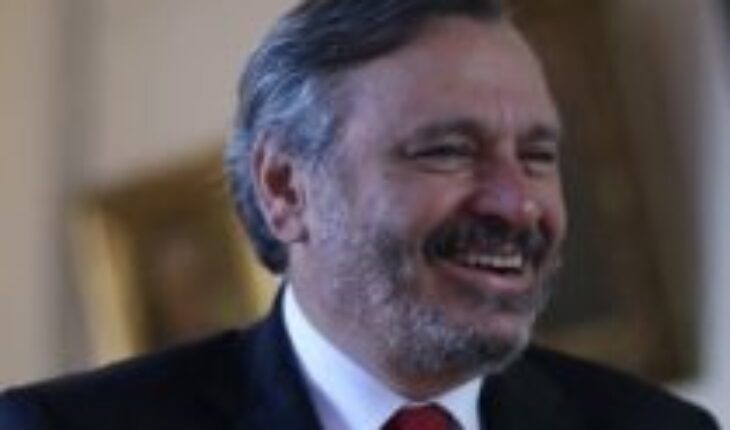Pablo Ruiz-Tagle was a visionary. On October 25, 2019, in full development of the social outbreak, the academic said in an interview with this media that there would be no viable way out without a new Manga Charter for the country. About three years after his declarations, with the work of the Constitutional Convention completed and ad portas of the vote that will decide whether to approve or reject the text, he assures that the proposal “comes to show demands that were submerged and that Chilean constitutional law did not see.”
According to the professor specialized in constitutional law, before the outbreak, we had very serious problems that affected our form of government, the exercise of rights, the legitimacy of the system of institutions, the strength of political parties, and the commitment of young people to our democracy. But none of that, in his view, was clearly seen in the heat of the outburst. And reaffirming the value of the constitutional solution set out in the political agreement of November 15, 2019, Professor Ruiz-Tagle pointed out that, regardless of whether people agree or not with the proposal, the valuable thing was the route that was set in that agreement, “when the political forces sit down and say: we’re going to take an in-depth look at our system and we’re going to ask the public.”
In conversation with El Mostrador, the dean of the Faculty of Law of the University of Chile highlighted the work of the Constitutional Convention, reviewing the milestones and questions that there were about the process, from its installation to the discussion of its Regulations, and assessing the delivery of the final proposal. “That text comes to show many demands that were submerged, that were marginal, that Chilean constitutional law did not see them and now they are seen. They are seen in the text, perhaps in a messy way, not systematic, with many words, but we can see it and that is a value. That’s valuable.”
Pablo Ruiz-Tagle at some point you exposed the existence of five republics in the history of Chile and that with the constituent process, whoever wins, it would give way to a Sixth Republic. What would this Sixth Republic consist of?
The Sixth Republic is a different political system than the one we have had since the year 90 to date. And I say that because there are many very serious people who maintain that we have lived from that year to date in the prolongation of the dictatorship. And I’ve never believed that. I believe that we have lived in an imperfect system from the year 90 until now, for 30 years, a very unequal system, with abuses, with corruption. But it has been a republican democratic system. And so the big challenge we have is whether we can build something better, like a Sixth Republic, starting this year or next year. And what is the date of birth of that new republic? Some might say it’s the first plebiscite, but no, I don’t believe that, because that plebiscite gave continuity to the Constitution we have. While others might say that it was the plebiscite of September 4, if the new Constitution is approved, a new Republic would be born, because there will be a social and democratic State of rights, there will be a State with parity, a political system where there are economic and social rights, recognition of indigenous peoples, all matters that were not recognized and it is possible to accept that idea, but the paradox is that the emergence of the new republic can also occur from the Rejection, a political agreement could be constituted that leads us to a different Republic.
What has the Republic been like in the last 30 years? I have characterized it as neoliberal in rights, because freedoms are emphasized, and neo-presidential in the structure of government. And if it turns out that we move to a social and democratic State of rights, where economic and social rights are very important; and we have a distribution of power that does not assign all-encompassing powers to the President; in one of those we are going to have a social and democratic republic that will not be parliamentary but of an attenuated presidentialism; and that these would be the characteristics of a Sixth Republic. I imagine that this can happen in a short time, relatively, in a year or in six months. Let’s see when the change occurs.
—Some law professors argue that legal norms go after social changes, that first society mutates and there the law goes behind trying to do its own thing. It is curious that in Chile we have changed the order of factors, because we asked a constitutional convention to fix political problems. serious that the policy had not solved. What do you think about this?
Today there are many controversies on this matter. At what point can the law advance the changes? I do not believe that law, by definition, as the great professor Eduardo Novoa said, is an obstacle to social change, a dam to social change. I don’t believe that. I believe that law is a rationalizing force of change, the engine of change. The law serves so that the demands of the majority, for example, are compatible with respect for the rights of minorities and that majorities do not crush minorities when they make changes. So, the law can install things that did not exist in society. Let’s think about what it meant for Chile in the nineteenth century to be perhaps the first country in Latin America that gave itself a right of its own, because we were during the Colony governed by Spanish laws, which had been given to us by the Spanish Crown. And at what point did Chile decide to have its own legislation? Well, in the second half of that century. And he did it by looking at European countries and copying some, but such is the force of change, with this new legislation, that many of those codes installed institutions, principles and rules that in Chile were not even known. The clearest example was the Civil Code, which was gradually in force. This has been explained well by Hernán Corral in a text. It is as if we were saying: the Civil Code first governed in Santiago, then in Santiago and Rancagua, then in Santiago, Rancagua and Talca; it was gradually acquiring validity, strength, because it was not possible to install an entire Civil Code at once. And then the law can be a factor of change. And it is, as I say, an orderly and rational change.
A more recent example we have of how the law contributes to change is the reform of criminal procedure, which installed trials and ways of deciding who goes to jail and who does not. In Chile it did not exist. So there you see how the law installs new things. The law does not always lag behind. In the case of the new Constitution there are old ideas. Let me give you an example. There is talk of an autonomous commune. This concept is in a constitutional project of the late nineteenth century that had a very important conservative parliamentarian, Manuel José Irarrázaval. And he tried to make us have autonomous communes. Well, in this new constitution the idea of the autonomous commune is included. And on the other hand, there are totally new institutions, such as the installation, for example, of an Ombudsman for Nature or an Ombudsman for Indigenous Peoples, which did not exist before. So, this proposed Constitution has picked up old things that renews them in a way and also installs things that we did not know, modifying the landscape, let’s call it that, of the legal system.
—In the event that the Approval wins, there is talk that some things must be modified to make the constitutional proposal applicable to Chile. If you had to prioritize one, what changes would you make to the constitutional proposal if it passes?
It’s hard to say one. I think there are many things that would be good to review. Something I have been struck by something that I have not heard about. And it is that the project contemplates two Constitutions. One, is the one in the permanent articles, where there are new ideas about how to organize the government, the parliament, regionalization, the native peoples, a lot of rights (a huge amount of new rights), and this Constitution has more than 300 articles. But there is another Constitution, which is that of the 57 transitory articles; and it contains in some things issues contradictory to what the permanent Constitution says. Also, something that worries me, is that this second part gives a lot of power to the President, too much. It gives the President the exclusive power to introduce in the coming years about 30 bills that could remake the entire system of rights to make it compatible with the Constitution. And it is curious, because in the permanent part of the constitutional proposal it was established as a principle that parliamentarians can present projects directly (which I think is a very criticizable idea). In the current Constitution they cannot in certain matters, in which they are the exclusive initiative of the President. Well, now, the new Constitution, in its transitory part, tells the President that you have to present (as an exclusive power) a project in social security, in education, in health, to reform the whole system. That has a justification: we have to make the Constitution stronger, stronger; but the figure of the President is again too powerful in this period of transition of the Constitution that emanates from the Constitutional Convention. And this was not foreseen in the Convention, because it was going to to operate first with seven thematic commissions and then there was to be a harmonization commission. And since the Harmonization Commission was assigned a job of polishing the text, a Transitional Rules Commission appeared to dictate these 57 articles, which are like the fine print of the Constitution. I’m worried, there’s a prefabricated design that’s worrying.
—Legally, do you agree with what the rector of the Diego Portales University, Carlos Peña, said that in case the Rejection wins, the constituent process must be done again without the need for a new constitutional reform, because the rules that establish it would be in force?
What Carlos Peña has said is not that we do not need to make any reforms. What I understand is that he says that the norms that were modified to the current Constitution (product of the political agreement of November 15, 2019), that allowed the election of the Convention, that imposed limits on it and that then allowed to determine that there was going to be an equal distribution, that it would have seats reserved for indigenous peoples, all those articles, what Carlos Peña says, who is right, have not been repealed. They are there. But what can’t work on those articles are the dates and deadlines that were set. So, Carlos Peña says: “if we have that system installed, we could use it by modifying the dates.” And I think he’s right. The rules have not been repealed, they have not been eliminated, they have not left the system.
But there are other alternatives, because the constitutional reform of the 4/7 has advanced so that the current Constitution can be reformed, even entirely by 4/7, which further facilitates the path to reform. Now, there are some people who say yes, but those are reforms and what we need is replacement; install an entirely new constitution. And to replace the Constitution, the only path we can follow is that of the norms that led us to the Convention, which are those mentioned by Rector Peña. I do not agree very much with the latter. I believe that a total reform of the current Constitution could be made without having to go through the same path that we follow, via the Convention.
However, here comes the political question, from a political perspective, I think it is difficult to give political viability to that reformist path. It is fitting that the power of Parliament and the President, the constituent power, should be very attached to the People. And then the path of choosing a Convention should be followed. Perhaps the convention can be different, it can be a smaller convention, it can be a convention in which the parties have a more important distribution, it can be a Constitution where the reserved seats are less, where the principle of parity is not applied equally. Anyway, there may be a convention with another distribution, which would mean changing those rules. “But maybe you have to think about a Constitutional Convention.”
Ruiz-Tagle clarifies that he has never been a supporter of entry plebiscites and believes that it was a big mistake to make an entry plebiscite, for many reasons, but mainly because “it ties the system.” However, he assures that “if we are going to enter into a process to elect a new convention, I unfortunately have to say that we should think about making another plebiscite of entry, that we should ask the citizens again: and now what system do you prefer? That of the convention that has already been elected, that of a new convention, that of a small convention or that of a Mixed Convention where the parliamentarians are together with other elected persons; so that we can have an opinion, a citizen deliberation on that matter.”
I also believe that “constitutional uncertainty is something very negative for progress, for the development of the country, for public order”
What final reflection can you think of in this scenario that we are experiencing, in a scenario of constituent process, uncertainties and changes. What is your reflection as a jurist?
It is very important to listen to new demands and it is very important to work to integrate them into the democratic process. That work, in a constitutional democracy, has to be done by the parties. Political parties are fundamental to democracy and here the parties have been a bit distant. There have been perhaps some parties that have been more involved than others. This would be the first reflection.
The second is that I believe there is a generational change. And I notice it in the university, in the Faculty of Law there are issues that have not been transmitted. I don’t want to talk about a failure, but there is a certain frustration in the generation to which I belong, which is a generation that vibrated with the epic of October 5, ’88, that vibrated with theThe good macroeconomic results and the stability of the 30 years of democracy that we have had, which in terms of the figures is the most successful, regardless of the inequality figures (even in this progress was made, they were improved a lot). And there has been something that has not been transmitted to the new generations. And then to have the opportunity for the demands of the new generations to be expressed, to be summarized in a text, in a deliberative constituent process, is very good because they could have remained hidden and we could have continued to believe that things were being done well and that Chile was the example of the world and that Chile was the most orderly country and that it had to teach everyone. And it’s not true. So that lesson of humility, of listening to what is coming, of listening to how representative democracy may have to be combined in part with some forms of direct democracy, that we must give recognition to indigenous peoples and that the principle of parity must govern in constitutional bodies.
Finally, the academic reflected and assured that we are “in a moment of listening, of reflection, of critical thinking, of listening above all to each other.” And he considered himself very optimistic. “I believe that we will emerge strengthened from this, regardless of the result of the plebiscite, because I trust that rationality will prevail. Constitutions, although sometimes they do not turn out, in the long run impose their best solutions. And I think that’s going to happen in Chile as well.”
Follow us on





